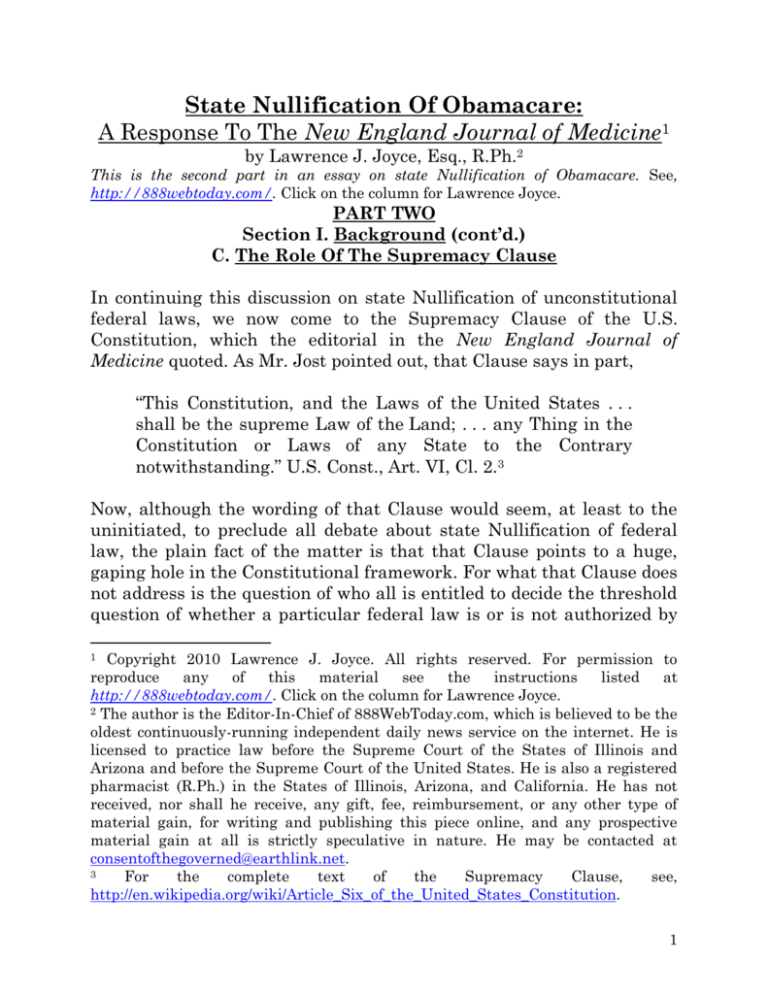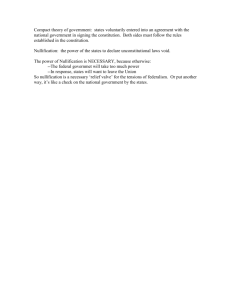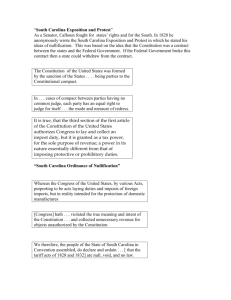
State Nullification Of Obamacare:
A Response To The New England Journal of Medicine1
by Lawrence J. Joyce, Esq., R.Ph.2
This is the second part in an essay on state Nullification of Obamacare. See,
http://888webtoday.com/. Click on the column for Lawrence Joyce.
PART TWO
Section I. Background (cont’d.)
C. The Role Of The Supremacy Clause
In continuing this discussion on state Nullification of unconstitutional
federal laws, we now come to the Supremacy Clause of the U.S.
Constitution, which the editorial in the New England Journal of
Medicine quoted. As Mr. Jost pointed out, that Clause says in part,
“This Constitution, and the Laws of the United States . . .
shall be the supreme Law of the Land; . . . any Thing in the
Constitution or Laws of any State to the Contrary
notwithstanding.” U.S. Const., Art. VI, Cl. 2.3
Now, although the wording of that Clause would seem, at least to the
uninitiated, to preclude all debate about state Nullification of federal
law, the plain fact of the matter is that that Clause points to a huge,
gaping hole in the Constitutional framework. For what that Clause does
not address is the question of who all is entitled to decide the threshold
question of whether a particular federal law is or is not authorized by
Copyright 2010 Lawrence J. Joyce. All rights reserved. For permission to
reproduce
any
of
this
material
see
the
instructions
listed
at
http://888webtoday.com/. Click on the column for Lawrence Joyce.
2 The author is the Editor-In-Chief of 888WebToday.com, which is believed to be the
oldest continuously-running independent daily news service on the internet. He is
licensed to practice law before the Supreme Court of the States of Illinois and
Arizona and before the Supreme Court of the United States. He is also a registered
pharmacist (R.Ph.) in the States of Illinois, Arizona, and California. He has not
received, nor shall he receive, any gift, fee, reimbursement, or any other type of
material gain, for writing and publishing this piece online, and any prospective
material gain at all is strictly speculative in nature. He may be contacted at
consentofthegoverned@earthlink.net.
3
For
the
complete
text
of
the
Supremacy
Clause,
see,
http://en.wikipedia.org/wiki/Article_Six_of_the_United_States_Constitution.
1
1
the Constitution. Obviously, the federal courts have the authority to
rule on the issue. But what about the states as well?
In an early major Supreme Court case in constitutional law, in 1819 the
Court was faced with the question of whether a Nullification law of the
State of Maryland was constitutional. In that case, McCulloch v.
Maryland,4 the state law had been upheld by the state’s highest court.
Significantly, even though the U.S. Supreme Court did hold that the
Maryland court had decided incorrectly that the federal law was
unconstitutional, the U.S. Supreme Court did not mention finding any
fault at all with the fact that the Maryland court had in fact decided the
constitutional issue one way or the other.
Likewise significant is the fact that the U.S. Supreme Court was not
even faced with the question of what the authority of a state is in
nullifying an unconstitutional federal law. For the U.S. Supreme Court
found that the federal law at issue in that case was constitutional, not
unconstitutional. Thus, although the Court was highly critical of the
legislature for having enacted a law to nullify a constitutional federal
law, i.e., a law made “in pursuance of the constitution”5, the Court made
no suggestion that the legislature had no authority to nullify an
unconstitutional federal law, i.e., a law not made “in pursuance of the
constitution”. But none of this, of course, is really different from what
happens anyway in federal court when a state law simply happens to
have the effect of interfering with federal law, even when in fact there
was no actual intent to nullify a federal law.
Now, if the states only had a duty to follow federal law, none of this
would be a problem. But the states, under their state constitutions, also
have a legal obligation to uphold state law, and to protect state law
against any intrusion by federal law which is not in fact authorized by
the U.S. Constitution.
McCulloch v. Maryland, 17 U.S. 316 (1819). See,
http://caselaw.lp.findlaw.com/scripts/getcase.pl?navby=case&court=us&vol=17&pag
e=316.
5 McCulloch, 17 U.S. at 424, 436. See,
http://caselaw.lp.findlaw.com/scripts/getcase.pl?navby=case&court=us&vol=17&pag
e=316.
4
2
For after all, it is one thing to recognize that federal law has supremacy
over state law in areas in which the federal government does indeed
have the authority to act; but this can hardly mean that deference to
federal authority could also somehow create for the federal government
whole new authority to act when even the Constitution itself does not
grant to the federal government the authority to pass any such law in
the first place. That would allow nothing more than a federal “finding”
that a law is constitutional to be a vehicle for abolishing all limits
whatsoever on any claim to new federal authority, even when there is
no support at all in the Constitution, or in its history, for the newly
claimed authority. In fact, such a theory would even necessitate the
precise opposite result in Printz, Lopez, and Morrison, which recognized
just how limited the powers of the federal government really are.
D. The Historical Debate On Conflicts Between State And
Federal Authority
Initially, this dilemma apparently escaped the thoughts of those who
drafted the Constitution. The issue did arise in the various state
conventions which ratified the Constitution, however, and was widely
addressed by the reasoning that the states could interpose their own
state government to prevent the federal government from doing an act
which it had not been authorized to do by the Constitution.6 Right after
the Constitution was ratified, however, people began to wonder openly
about how this conflict of authority was to be resolved.
Thomas Jefferson, the main author of the Declaration of Independence,
had not been present in the U.S. in 1787, when the Constitution was
drafted. At the time, he was our ambassador to France. But after the
Constitution was ratified he wrote that one need not worry about the
potential conflict between the authority of the federal government and
that of the states, because the states could always nullify, within each
state, a federal law which Congress had no authority, under the
Jefferson Davis, The Rise And Fall of the Confederate Government, Vol. 1, 159-160
(Da Capo Press 1990).
6
3
Constitution, to enact.7 What Jefferson had in mind was that a state’s
finding that a federal law violated the U.S. Constitution would be the
final authority within that state on the question of whether the federal
law did or did not violate the Constitution, and that the federal
government would have no authority to override that state decision.
The Commonwealth of Kentucky adopted Jefferson’s proposal in 1798.8
This set off a firestorm of debate, and Jefferson’s position was countered
by Patrick Henry, whose Give me Liberty, or give me death speech just
one month before the start of the Revolutionary War had already made
him so very famous. Henry was a lawyer who, after the war, had argued
vigorously against ratifying the Constitution on the grounds that it
gave too much power to the new federal government. Nonetheless, he
then argued that once any state itself had ratified the Constitution, it
had no authority to nullify a federal law. His arguments still did
nothing, however, to address the question of whether a given federal
law itself was even authorized by the Constitution.
Rising head and shoulders above each of these two great patriots was,
paradoxically, the shortest man of all: James Madison, the
aforementioned “Father of the Constitution”.9 He drafted certain
resolutions which were adopted in 1799 by the General Assembly of the
Commonwealth of Virginia, and which said,
“That this Assembly doth explicitly and peremptorily
declare, that it views the powers of the federal government,
as resulting from the compact, to which the states are
parties; as limited by the plain sense and intention of the
instrument constituting the compact; as no further valid
that they are authorized by the grants enumerated in that
compact; and that in case of a deliberate, palpable, and
dangerous exercise of other powers, not granted by the said
compact, the states who are parties thereto, have the right,
Ibid. See also,
http://www.associatedcontent.com/article/252920/thomas_jeffersons_arguments_for_
Nullification.html?cat=37.
8 See, http://en.wikipedia.org/wiki/Kentucky_and_Virginia_Resolutions.
9 See, Part One, Sect. I.B.2.a., pg. 7.
7
4
and are in duty bound, to interpose for arresting the
progress of the evil, and for maintaining within their
respective limits, the authorities, rights and liberties
appertaining to them.”10
George Washington, by contrast, thought that Nullification would
destroy the new government, and it was at his urging that Patrick
Henry gave his most passionate speech in opposition to Nullification.11
As time passed, discussion about the issue faded from memory,
however, and those who had openly worried about this question seemed
to have been worried about nothing more than a tempest in a teapot. It
did arise briefly when every New England state,12 plus the State of
Delaware, passed laws nullifying a federal embargo on all shipping
during the tension leading up to the War of 1812,13 though the issue
never produced an actual confrontation between any state and the
federal government at that time, and the issue became dormant once
again. But human nature has a way of pushing the limits of what is
permissible, and of ever testing the limits of what is impermissible, and
so the issue would not remain dormant forever. For those who have
power ever strive for more. As Lord Acton would put it, “All power tends
to corrupt and absolute power corrupts absolutely.”14
So Congress, as it turned out, sought to bring in more money, no matter
how damaging its taxes might be to certain parts of the country. In the
early days of our republic, almost all federal revenue came by way of
tariffs, and in 1828, Congress passed a large increase in tariffs on
certain goods, known as the Tariff of 1828.15 The effect of the tariff fell
most heavily on the people of the South, where the tariff was known as
See, http://www.tenthamendmentcenter.com/2010/02/05/raising-the-bar-forNullification/; see also,
http://en.wikipedia.org/wiki/Kentucky_and_Virginia_Resolutions.
11 See, http://www.amnation.com/vfr/archives/003648.html.
12 Maine was not yet a state, and was still an exclave of the State of Massachusetts.
See, http://en.wikipedia.org/wiki/Maine.
13 See, http://www.lewrockwell.com/dilorenzo/dilorenzo42.html.
14 See, http://en.wikiquote.org/wiki/John_Dalberg-Acton,_1st_Baron_Acton.
15 See, http://en.wikipedia.org/wiki/Tariff_of_1828.
10
5
the Tariff of Abominations.16 Among other things, it decreased the
money which foreigners had with which to buy Southern cotton, and it
resulted in the South’s providing a disproportional share of the funding
for the federal government through the tariffs. The federal government
modified this tariff slightly in 1832, but not enough to satisfy the people
of South Carolina.17 So enraged were they by the tariff that the
legislature passed a law declaring the tariff null and void as being
unconstitutional in South Carolina, and prohibiting any person from
collecting the tariff.18 This led to the Nullification Crisis.
President Andrew Jackson (“Old Hickory”), the hero of the Battle of
New Orleans, and the man whose image currently adorns out $20 bills,
answered by sending federal soldiers to South Carolina to enforce
collection of the tariff. But South Carolina was not about to back down,
and sent out a force of militia to intercept the federal troops. The
federal troops amassed at Castle Pinckney,19 looking out across
Charleston Harbor at Ft. Sumter. There they stood, like a coiled spring,
waiting for orders to strike. But South Carolina stood firm, and
President Jackson and Congress had second thoughts about the matter.
The tide was not turned until Congress ended the standoff by repealing
the most hated parts of the new tariff, and South Carolina responded by
repealing its Nullification ordinance. And so each side allowed an
implicit compromise to take the place of armed confrontation.20
This emboldened many a Southerner a few decades later during the
build up of tensions leading to the war we commonly call the Civil War.
Many Southerners at that time thought that all tensions between the
Southern states and the federal government should be resolved through
Nullification. But Nullification has always been recognized as being a
peculiar doctrine. Even Jefferson Davis, for example, who became
Ibid.
Ibid.
18 See, http://en.wikipedia.org/wiki/Nullification_Crisis.
19 See,
http://www.oldworldauctions.com/Auction127/detail.asp?owa_id=2145233142.
20 See, http://en.wikipedia.org/wiki/Nullification_Crisis.
16
17
6
President of the Confederate States of America, spoke out against the
idea that the states have an absolute, unlimited right of Nullification.21
E. The Continuing Conflict Of Jurisdictions
Conceptually, however, Nullification is based on a salient point: If the
federal government has no authority to do a particular thing, it would
constitute no violation of the Supremacy Clause of the Constitution for
a state to declare the unconstitutional federal law to be null and void.
For as the U.S. Supreme Court itself declared in Marbury v. Madison, a
law that is unconstitutional is simply void, period.22
The counterpoint, however, is also based on an equally salient point: If
each state were to decide for itself with finality which federal laws are
validly enacted under the U.S. Constitution, and which ones are not,
and if, at the same time, the federal government were unable to do
anything about it, then the whole Union would consist of a crazy
hodgepodge of states where some federal laws were deemed valid, and
were in full force and operation, and other states where such laws were
null and void. On top of that, the doctrine of Nullification, if applied
without reservations of any kind, would not even be limited to what
types of federal laws a state presumably could nullify.
A “federal” government can hardly be federal if it can never speak with
authority, and with finality, about the validity and enforceability any of
its laws across the entire Union. As Mr. Jost correctly pointed out, this
would defeat a principal purpose of establishing the Constitution in the
first place: having a central government with the authority to speak
with finality about the meaning and applicability of federal law.
Ed. note: This concludes Part Two of this essay on State Nullification Of
Obamacare. The next installment shall start to examine a possible means of
resolving the conflict between the federal and state jurisdictions regarding
unconstitutional federal laws. See, http://888webtoday.com/. Click on the column
for Lawrence Joyce.
Jefferson Davis, The Rise And Fall of the Confederate Government, Vol. 1, 161-162
(Da Capo Press 1990).
22
Marbury v. Madison, 5 U.S. 137, 176-177, 180 (1803); see,
http://caselaw.lp.findlaw.com/scripts/getcase.pl?navby=case&court=us&vol=5&page
=137.
21
7







